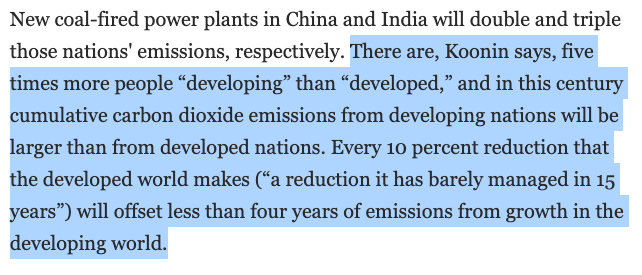Quick thread 🧵 debunking the misinformation in @GeorgeWill's latest ignorant climate musings in @washingtonpost @PostOpinions (1/14):
https://twitter.com/PostOpinions/status/1425545831487246339
The quote below is utter nonsense. The referenced "exhortations to combat climate change" are based on the authoritative @IPCC_CH report, and there have been plenty of climate policies proposed that are congruent with 'conservative agendas' like carbon pollution pricing (2/14) 

The below sentence is totally irrelevant. The Earth both absorbs and re-radiates sunlight. It's the amount accumulating on Earth (equivalent to >5 atomic bombs per second) that changes its temperature and climate (3/14) 

Please spare us the tired "climate has always been changing" red herring. The rate at which humans are currently changing the climate through the burning of fossil fuels is unprecedented at least in many thousands of years. *That's* the problem (4/14) 

I don't even know what the below quote is supposed to suggest. Humans obviously weren't significantly altering the climate 500 years ago (with relatively small exceptions like deforestation) and there was no "global cooling of 1940-1980" (temps were flat during that period (5/14) 

Again, human fossil fuel emissions are responsible for the *imbalance* or *change in* Earth's energy flows and hence for its climate change. This is basic stuff (6/14) 

"Koonin says" is obviously not a valid scientific reference. The @IPCC_CH report concluded that hurricanes are becoming stronger (more Category 3–5) (7/14) 

First of all, tornadoes are not hurricanes. Secondly, we don't know how/if climate change will alter the overall number of hurricanes. The problem is that it makes them stronger (8/14) 

I'd love to see the supposed "recent research" referenced here, because these claims are absolutely false 👇 (10/14) 

Wow @ the cherrypicked weasel words in the quote below: "average warmest temperature across the United States has hardly changed." Last I checked we were talking about *global* warming (11/14) 

The "plausible emissions scenarios" referenced below involve massive international efforts to decarbonize the global economy. That's exactly the point - that's what we need to do! (13/14) 

Ah yes, the "we don't need to take climate action now because we'll be rich in the future and will all be able to build new homes on mountaintops" argument. That's my favorite 🙄 (14/14) 

• • •
Missing some Tweet in this thread? You can try to
force a refresh









